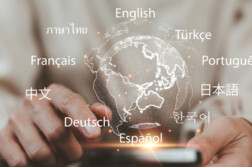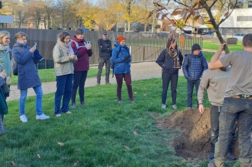Today’s students need knowledge, future skills, critical thinking and the courage to ask the right questions facing the common global challenges. All these skills they can acquire during their studies through student exchange abroad. In addition to language and cultural competence, internationalization provides students the ability to tolerate uncertainty and the ability to cope with difficult situations. Our job in the international services of Häme University of Applied Sciences (HAMK) is to inspire and encourage students to seize the exchange opportunities available to them during their studies and after graduation.
Sustainable future is a common matter
Young people of this generation have more interest in environmental matters, and they want to influence different issues relating to that. Students are aware of global challenges and environmental concerns are shared. Even though students already have a lot of knowledge, it is important that education prepares students to perceive and promote the Sustainable Development Goals. In student guidance, we highlight the theme of responsibility in exchange studies. We provide information to students on how they can make environmentally friendly choices, for example, when travelling to an exchange destination. Even though the student makes the choice, it is our responsibility to provide up-to-date information on the matter.
This is strongly linked to the Green Erasmus priorities of the Erasmus+ program of the Finnish National Agency for Education. The goal is to travel overland, reduce emissions and become more environmentally aware. Students can receive an additional Erasmus grant if they choose a more environmentally friendly travel option than by plane to the transfer destination, such as a train or bus. However, Finland’s location is challenging compared to other European countries. Boat travel is not considered environmentally friendly, so there is no extra support for choosing it. Travelling by car or train is not necessarily the most ecological option when leaving Finland if the route first goes north and then via Sweden to Europe. Still, we can encourage students to use public transport in the exchange destination and choose the train instead of the plane when travelling from one country to another within Europe.
Making environmental responsibility visible in a daily work
Environmental responsibility is part of HAMK’s services in many ways. The most significant issue in the International services is managing the student mobility completely digitally. We use the digital SoleMove platform, where the student and staff exchange process is processed digitally all the way from the application to the final report. This is how we are able to implement the European Commission’s Green Erasmus+ goal of paperless Erasmus exchange. We market this good practice further when cooperating with partner schools.
We can constantly develop in how we bring up the theme of sustainability under the student counseling. We want students to be aware of the theme and pay attention to their surroundings during the exchange. Even small, more responsible choices matter. This fall we have created our own Teams platform for students going abroad, where we offer meetings and guidance for the students. We are in the process of building a material package related to the theme of sustainable development, which will include material related to how sustainability can be taken into account during student exchange. One tool is the travel overland website (Maatapitkin.net), where students enter their exchange destination, and the site gives different itineraries on how to travel to the destination by land.
During the exchange, students gain new experiences and get to know people from different backgrounds. By paying attention to the themes of sustainability during the exchange, the student’s understanding of the state of society increases and he/she learns to look at things from different perspectives. Student exchange gives students competence to observe issues that would be important to pay attention to globally and what actions everyone can take to promote a more sustainable future.
This is a translation of the Finnish blog post ”Kestävä kehitys opiskelijavaihdoissa” published on 23.11.2023.
Author
Miia Ståhlberg, International Officer, HAMK International




